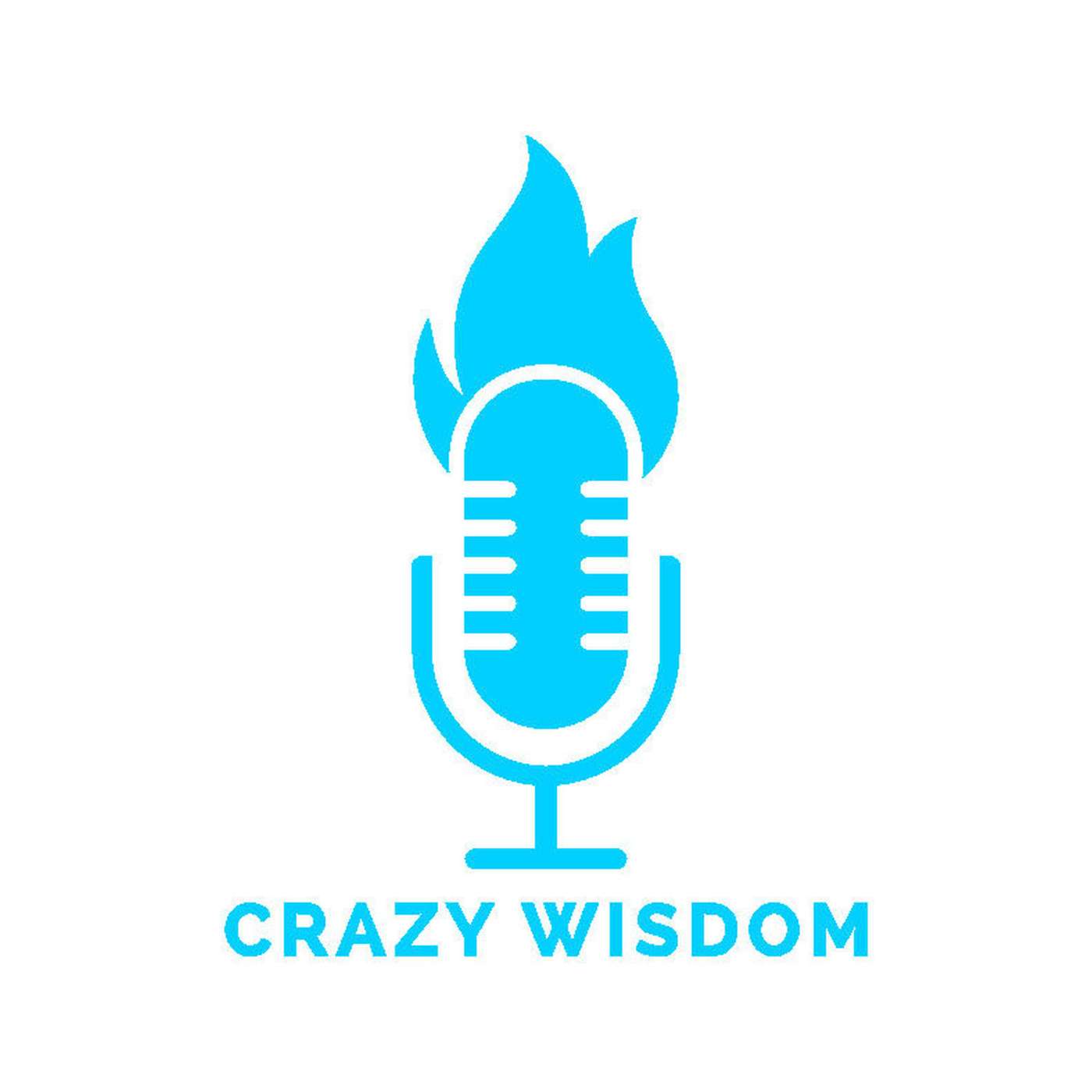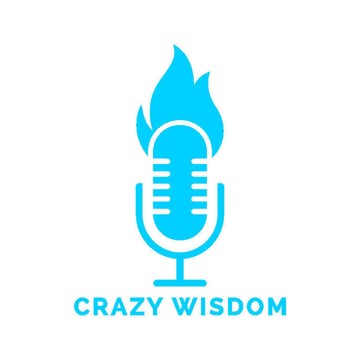

Crazy Wisdom
Stewart Alsop
In his series "Crazy Wisdom," Stewart Alsop explores cutting-edge topics, particularly in the realm of technology, such as Urbit and artificial intelligence. Alsop embarks on a quest for meaning, engaging with others to expand his own understanding of reality and that of his audience. The topics covered in "Crazy Wisdom" are diverse, ranging from emerging technologies to spirituality, philosophy, and general life experiences. Alsop's unique approach aims to make connections between seemingly unrelated subjects, tying together ideas in unconventional ways.
Episodes
Mentioned books

May 16, 2022 • 1h 7min
How can we trust anything anymore? - Sam Patten
A distant cousin, a writer who lives in Maine, and a former political consultant. Why is 1957 a bad time to get stuck in a honey pot? 1962 is when the Cuban missile crisis occurred. What is Mr Jones? Is Russia a threat to the United States? What does a great policy towards Russia look like? What is the policy towards Russia? What is the policy towards China? What are the forms of leverage that China has on the US? How about Russia? Who is Peter Splitzer and his book? What is going to happen to Europe when it comes to alliances with Russia and the US? What does the Monroe doctrine look like from a Russian perspective? What is NATO doing? What is the role of nuclear power? NATO Article 5 was only used after 9/11. Why do you disagree with? What does a desperate Russia look like? Who is Gerhadt Schroder? Is the Ukraine War a civil war? What is the role of the UN in the New World Order, which is essentially a lack of order? The planes never arrived. Who were the victims of Joseph Mcarthy? What is the future of the American political experience? How can the Republican Party stop being reactive? Column for three newspapers Village Soup (Crossfire Hurricane)

May 10, 2022 • 1h 12min
Who was the Bitcoin Jesus? - Bernardo Oliveira
His business is like Jack Mallers’ Strike, but in Brazil. What is the Bitcoin scene like in Brazil? What is Bitcoin Maximalism? Which cryptocurrency is the most reliable? Is there a better alternative to democracy? What is a hardware wallet? What is the Lightning Network? What is Bitcoin Beach? What is the effect of hyper-inflation on bitcoin? Who was the Bitcoin Jesus? What were the Block-Size Wars? What are your favorite psychedelic substances? @didimosats

May 2, 2022 • 1h 10min
What is the Tirrel Corporation? - Christian Langalis
Christian Langalis is the co-founder and C.E.O. of Tirell Corporation What is Orbis Tertiary? What is the Orbis Ledger? Are there any cyberpunk references for Urbit business? What is the distinction of cyber-punk? Dystopia. What is cypher-punk? Who are Timothy May and Satoshi Nakamoto What is the overreach of instrumentalization? What is the atomization of the social? How did computers atomize humans even further? In what ways has studying culture informed your world view? What is the ultimate holy grail for Tirrell? What is an interregnum? What is the role of Urbit in the Web 3.0 ecosystem? How do you maintain legacy systems on an entirely new system that is censorless? What is a Spot ETF and why is it important? What is Bitcoin’s fifth pillar? (15 minutes) What is a cantalon insider? What is the New World Order that George H. W. Bush setup and how does it work now? What is the Minsky Moment? What is the Austrian tendency when it comes to economics? Who are Larry White and George Selgen? What is synthetic commodity money? What is the New Wyoming Bank Charter? What are Full-Reserve Cryptocurrency Banks? What is the difference between a bank and a bitcoin wallet? What are interbank clearing systems? What is the difference between a deferred system and a credit card settlement? What is unchained capital multisig? What is an FBO? What are extant regulations? What is the Nick Land quote (“in the mouth of madness”) (25 minutes)? How did science fiction inform your life? Who is Phil Monk? Urbit strives to have a system that is human scale, that will never require the long-term intervention of a specialized third party. Why do people call Curtis Yarvin an authoritarian? What is peer discovery? What is the contained podcast and who is Barret (36 minutes)? What are your favorite exclaves? How do I use Tirrell? Download the thing (find the thing). What is landscape (groups) programming language? What is the future of NFTs when it comes to fan groups? NFT’s can be digital cellophane wrappers for an album. How many people are in the Tirell corporation? What should someone know about the Urbit foundation? What is Hoon School? Do you have any insight into the people aspect of doing business? How is Tirell corporation set up? What church do you belong to (55 minutes)? What is the correct view of Urbit? What is the Jungen? What is Cottage Core? What is the relationship between Solipsism and being a Luddite? Who is Junger? What is the naming scheme? ~tirrel ~pindet-timmut ~tirrel corporation tirrel.io

Apr 25, 2022 • 1h 13min
How can we minimize conflict and maximize collaboration? - Erik Newton
Erik Newton is the C.O.O. of tlon.io which is the web development service for Urbit. Urbit is a place where you can speak your mind without worry of being censored. He used to be a lawyer, researching how humans can be removed from the execution and enforcement of contracts. He also had a podcast which attempted to pinpoint the causes of conflict in human relationships. Urbit is 3 pieces of technology: A virtual server built from the ground up; very secure, durable, and simple. A peer-to-peer encrypted network connecting all of the servers. A decentralized verification system. Data is not harvested on the Urbit network as it is on other social media networks. Humans can’t put genies back in their bottles. Get ready for Web 3.0! urbit.org tlon.io

Apr 18, 2022 • 56min
What is it like to become part of the outgroup rapidly? - Steve Kirsch
If you are interested in the info on the podcast please make sure to verify yourself the information that is presented You are on your own now for determining what is true. No trusted groups are now responsible for it. You can't outsource it. The best way that I have found to find what is true is to ignore what the mind wants to be true and relentlessly attack your own notions of what is true. Ask is that true? Over and over again until you find out If you verify it yourself please find Steve Kirsch on Substack here: https://substack.com/profile/40661664-steve-kirsch For reference from the audio on the debate between two trained experts: James Lyons-Weiler on Substack: https://substack.com/profile/40349055-james-lyons-weiler

Apr 11, 2022 • 51min
Accessing the Unconditioned Mind - Jonathan Harrison
Jonathan Harrison's work is in learning to become more realistic. The more we connect to what’s really happening as opposed to what we think, we realize that what we think is our creativity operating, but the real world is just happening (including our thinking which is part of the real world). Then from this more realistic viewpoint, what we think ceases to disturb us because we realize it has no particular validity or meaning whatsoever, other than expressing our state of mind at the point that we may express it. The Unconditioned Mind: With a direct view of reality as it is, in which things that aren’t real don’t disturb you. You might call it a gentle adjustment or correction to our faulty education. Anger is a physical and mental state which we sometimes get into. When we’re angry, it’s temporary insanity and our judgment isn’t as good at that time. People who attack with anger are generally in the greatest need. Happiness is a biological drive that can cause anger. There’s always pain hiding behind anger. Listening to an angry person can diffuse their anger. Confusion is a common reaction to this work, along with fear and the whole spectrum of emotions. Ultimately there is no terminology in this work, and it doesn’t depend on any theory. For these reasons, it can get strange very quickly. We are all scientists. Nobody understands anything, but this doesn’t stop us from trying. The process of learning is updating our expectations according to the evidence. If you can accept that what’s happening now is not what you think, you immediately may face an open space of pure awareness in which you don't know what to be aware of, you don’t know who’s aware, you don’t know what awareness is, and it really doesn’t matter anymore. The goal is awareness of things as they are, as opposed to things as you think they are. In this work we don’t start from the assumption that a problem exists so there’s nothing to heal or solve, and we don’t start with the assumption that a problem doesn’t exist so everything is open. If there’s a problem and you have a solution, no need to worry. If there’s a problem and you don’t have a solution, there’s also no need to worry. Be wary of any teacher who is claiming to be enlightened, they may have missed the point.

Mar 31, 2022 • 59min
Reclaiming Personal Agency - Michael Batrano
Michael Batrano is the founder of Libertis Horizon, a private society event happening in San Diego that is focused on freeing individuals around the world from the control structures that keep us living scared, disconnected lives and restrict our personal agency. In this episode, we discuss control systems, how the elites have deceived us into giving away our agency, and much more. You can find him on his website www.libertishorizon.com and on the associated Telegram group. 1:16 - 15:46 -The two systems US citizens are living under. -Why knowing yourself is important to navigating yourself out of the negative system to the positive one -How the negative system has caused us to overintellectualize our lives. -How propaganda distracts you from the damage done by the negative system -Everything we use is owned by a few private groups. How do they maintain control? 16:00 – 17:55 -What is democracy? Is it useful? Does it offer any protection? -The REAL difference between a Democracy and a Republic. 17:56 – 19:27 -The unique opportunity modernity has presented for enabling individuals to build their own private worlds 19:30 – 25:09 -How we get trapped in the elite’s world without our consent. -Why you need to understand the contracts that keep us bound to these control structures -Everything in society is fiction. -How the idea of the US is now upside down. 25:27 – 34:23 -Examples of governments that have enforced control systems on their citizens -Does the US constitution offer more protection from autocratic systems than other constitutions? -Facebook and Google have been compromised. -Why guns are the last bastion of freedom in the US. 34:25 – 46:21 -A bit about Michael’s past -Lessons learned from fatherhood -How Disney implants the wrong ideas about love in us -How to keep yourself open to love despite the risks -Human nature is not innately destructive - we’re influenced from even before birth to have baggage. 46:50 – 53:25 How to find out more about the Libertis Horizon event.

Mar 21, 2022 • 1h 6min
What are the three technologies of the future?
Particularly what technologies will help us remove ourselves from systems of waste and hopefully inequality of opportunity. Many people think that we are in a dark age but what if in fact the last few years have been a civilizational level psych-out and we are on the cusp something truly great and transformational. Listen for more by Ben Magelsen (you can find him on Twitter at @benmagelsen

14 snips
Jul 7, 2021 • 1h 41min
How has the world changed post COVID? - Jim O'Shaughnessy
James O'Shaughnessy is the founder, chairman, and co-chief investment officer at OSAM (O'Shaughnessy Asset Management). In this episode, we discuss the changes that have come about in the world post-COVID, mainstream media, politics, navigating the future as a society, the law of attraction, and much more. You can catch Jim’s podcast, Infinite Loops, at www.infiniteloopspodcast.com. Enjoy. 1:58 - How covid accelerated the evolution of work meetings 6:47 - What is quantitative analysis? And how is it different from hedging bets? 13:36 - The world, especially after covid, has changed with respect to investing and decision-making, what do these changes look like? What will they result in? 19:08 - The crazy thing about Silicon Valley 21:24 - A rule of thumb for filtering who to have political discussions with 22:07 - How mainstream media in America is committing suicide 31:12 - How to deal with self-deception and how it is easier for intelligent people to fall prey to self-deception. 36:47 - How do you navigate the differences between eastern and western philosophy? 48:04 - The dangers of premature certainty 48:43 - The truth behind the law of attraction 54:01 - What is negative compounding and why should you be wary of it? 1:00:50 - Why free societies do better than unfree societies. 1:12:31 - Why you should see life as a “choose-your-own-adventure” game 1:20:44 - Why the atomization of society, the destruction of geographical boundaries by the internet, and addiction to social media outrage all work to serve a healthy purpose. 1:31:20 - Why marketing is the bedrock of all of humanity’s greatest institutions.

Jul 2, 2021 • 1h 3min
What is meant by the phrase "The medium is the message"? - Steven Fan
Steven is trying to discover the next culture that’s emerging to replace conventional western culture and is also trying to be part of its formation. In this episode, we talk about order, blockchain, decentralization, media, information, eastern spirituality, and much more. You can reach out to Steven on Twitter @_StevenFan 1:30 - What is the relationship between top-down and bottom-up influences when it comes to the formation of culture? 1:59 - Is the universe itself inherently bottom-up? Is order built up or pressed down? 6:44 - What is a cultural membrane? How do they influence a culture? 13:15 - As the world becomes more of a global village, is the decentralization of the internet possible with the current model of the internet? Should decentralization even be a goal? 18:15 - In the quest for decentralization, are languages like Solidity (Ethereum’s programming language) useful for creating large-scale applications, like Twitter, for example? 26:49 - How centralized technology can trap us in an information bubble. 28:57 - What is meant by the phrase, “the medium is the message?” 34:32 - What is the salience network and how does it influence how we perceive and process information? 36:35 - How paying attention to the salience network can lead to spiritual experiences 41:58 - Does consciousness exist beyond the brain or body? 48:07 - How does the brain create the unitary perception of reality? Is the brain even the actual mechanism behind this unitary perception of reality? 51:48 - What is information?


